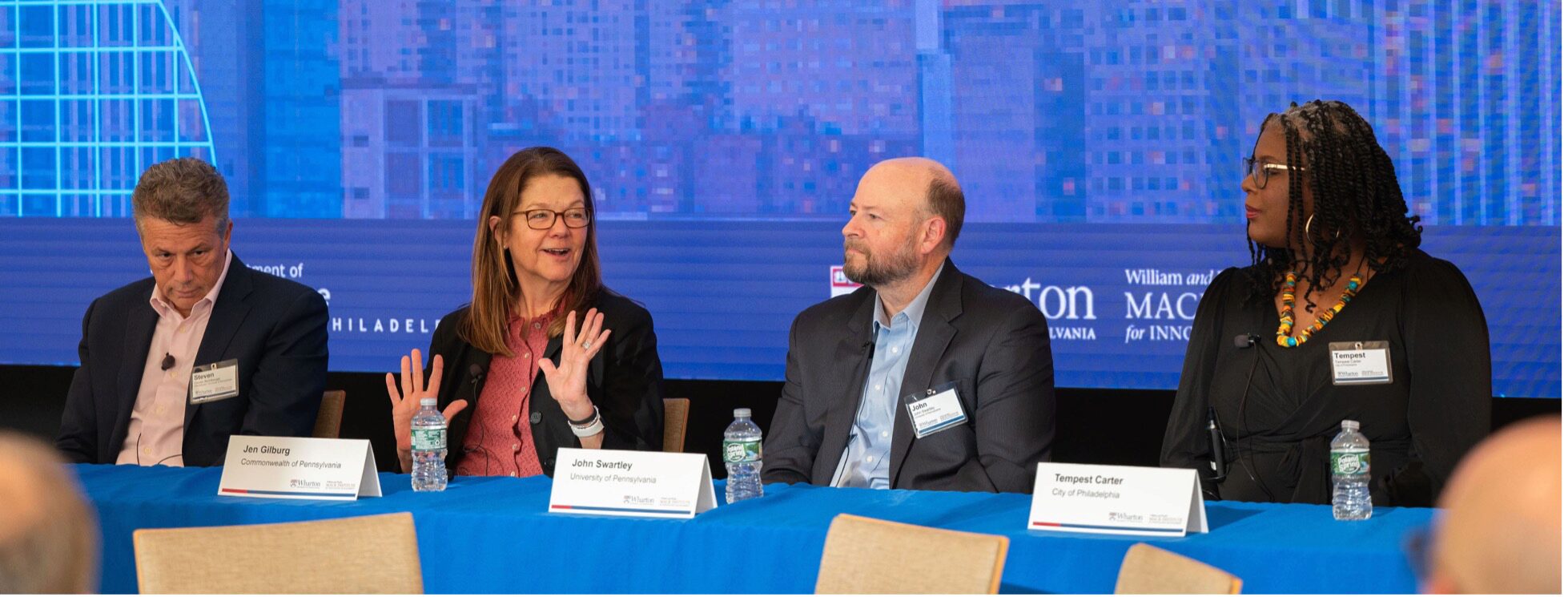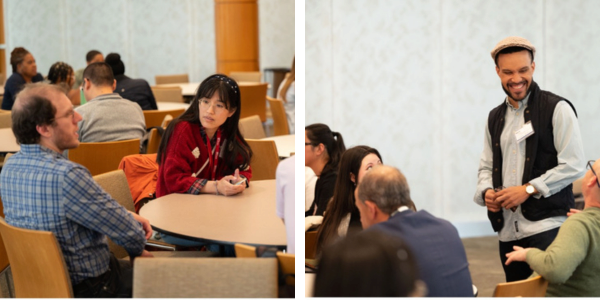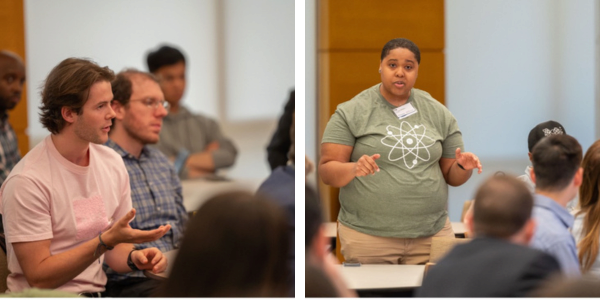 Panelists Steven Nichtberger, Jen Gilburg, John Swartley, and Tempest Carter
Panelists Steven Nichtberger, Jen Gilburg, John Swartley, and Tempest Carter
On April 24, the Mack Institute, together with Philadelphia’s Department of Commerce, presented Tech Talks, a panel discussion with government officials and entrepreneurs on how Penn and Wharton can help solidify the city’s future as a leader in innovation and entrepreneurship.
Speaking to an audience made up of Penn students and affiliates and representatives from the city, the speakers addressed Philadelphia’s unique challenges and assets when it comes to its tech ecosystem, and how building bridges between Penn and Wharton and the geographic region at large can create jobs for the city’s workforce.
Punching Below Our Weight?
While Philadelphia does have some impressive startups (such as Penn biotech spinouts Spark Therapeutics and BlueWhale Bio), public perception persists that, despite assets like a central location, low cost of living, and access to top universities, the city is “punching below its weight” when it comes to innovation.
“We have all the ingredients to be far more innovative than we currently are,” said panelist Jen Gilburg (Deputy Secretary for Technology and Entrepreneurship for the Commonwealth of PA). “We’re in the mid-Atlantic region, within driving distance of 40% of the US population and half of Canada’s. But we’re punching far beneath our weight because something’s not working.”
Gilburg suggested that entrepreneurs can be successful in Philadelphia and throughout Pennsylvania by tackling issues that Silicon Valley “just isn’t thinking about,” such as agricultural technology. She also suggested that Wharton in particular could be a great source of business leadership for nascent local startups.
“We have a lot of founders who are serving as the Chief Executive Officer of their companies when they really should be the Chief Technical Officer,” she said. “We have the opportunity to pair them with graduates and alums of one of the best business schools in the world using a venture studio model.”
 Participants networking before and after the event
Participants networking before and after the event
Moving Beyond Tech Transfer
John Swartley, Penn’s new Chief Innovation Officer, spoke about how the university’s commercialization efforts have evolved due to the evolution of industrial R&D programs and the growing influence of startups. Traditionally, Penn’s technology transfer efforts were mainly “transactional,” focused on patenting faculty discoveries and licensing them to existing companies—a method that worked well in the late 80s and 90s but began to falter in the 2000s as the landscape shifted towards outsourced R&D and startup-driven innovation.
“We realized that if we didn’t get into the business of participating more directly in product development efforts and supporting startups, we were missing out on more than 50% of the commercialization market,” he explained. “The founding of Penn Center for Innovation (PCI) was a direct outcome of recognizing that we were going to have to do more than just file patents and issue licenses. We had to get our hands dirty helping to form and support companies, bring in entrepreneurs, set them up with labs and facilities, and help develop critical products toward the market.”
Swartley noted that over the past decade, this proactive approach has led to the formation of over 250 companies and the execution of thousands of commercial contracts. PCI has not only increased the university’s engagement in tech translation but has also enhanced the regional economic landscape by facilitating the ‘stickiness’ of startups in the region—encouraging them to stay and grow locally.
 The panel discussion was followed by a Q&A session
The panel discussion was followed by a Q&A session
Fostering Town-Gown Symbiosis
A major point of discussion was the importance of keeping Penn and Wharton students in the area after graduation. An oft-cited statistic claims that only 14% of Penn graduates stay in the Philadelphia area, with most decamping for New York or California. But that may be changing – as panel moderator Valery Yakubovich (Executive Director, Mack Institute) pointed out, the most recently admitted undergraduate cohort saw the largest number of students from Philadelphia. Yakubovich suggested that students with an existing connection to the city may be more likely to stay and contribute their skills and resources to the city’s innovation ecosystem.
Panelists Steven Nichtberger (CEO, Cabaletta Bio) and Tempest Carter (Director of Strategic Tech Initiatives, City of Philadelphia) discussed how Penn can be a responsible player in the city’s tech scene, particularly in regard to equitable workforce development. Most of the audience questions related to these issues as well, with many coming from local Philadelphia nonprofit and government workers. Nichtberger and Carter both see great potential to uplift workers through Penn startups and programs, yet stress that such growth must be undertaken mindfully.
“We need to connect our workforce with vocational training so that new laboratory and manufacturing jobs can be filled by people who have the appropriate technical skills, but also the desire to stay in Philadelphia and enhance their lives,” said Nichtberger.
Carter agreed, emphasizing the desire of Philadelphia’s workforce to achieve social mobility through vocational education.
“There are a lot of Philadelphians who want to increase their economic status through education,” she said. “We’ve seen success stories in other industries, like the large number of Black women who have risen to the middle class through careers in nursing. There are ways to empower yourself, your family, and your community, and we are here for you.”
Yakubovich echoed these sentiments, saying, “Tonight’s event was an important first in the Mack Institute’s efforts to build bridges between ourselves and the city where we live and work. This is an important partnership that is long overdue for development.”



